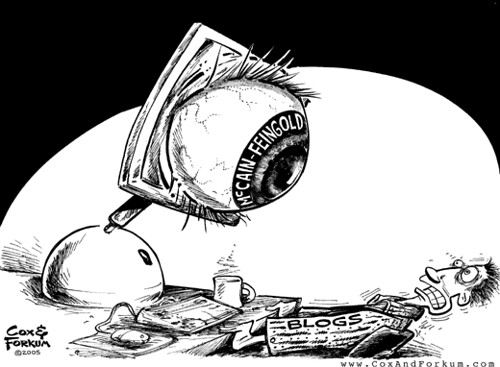Party Identification in the Blogosphere
"'I've found this to be a remarkable phenomenon. In the blogosphere, you have almost a reverse dynamic to that found in the media. Overwhelmingly liberal bloggers identify themselves directly as Democrats. Yes, there are many who see the party as the lesser of two evils, and in their hearts would prefer Dennis Kucinich or Ralph Nader, but overwhelmingly I've found bloggers on the left have no problem saying 'yep, I'm a Democrat' (I obviously count myself among that group).We are not certain Willis is right about left-bloggers being more likely to self-identify as Dems than right-bloggers are to self-identify as Repubs. However, it fits roughly with our observations, if one considers only the one-dimensional aspects of political views. For the purposes of this discussion, we'll take it as "Truth."
'But among bloggers on the right, it always seems that great pains are taken to make it clear that they are 'independents' or 'libertarians' - these are people who usually endorse much of the GOP agenda and reliably vote for Republicans - and they don't identify as 'Republican'. Yes, there are some like GOPBloggers who identify with the party, but that was essentially a recent development.'"
We are registered as Republican, and have no trouble saying that. We rarely find a Democrat we can consider voting for, so over the years our non-Republican votes have gone mainly to Libertarian candidates. Even so our profile says "libertarian conservative" not "Republican." We haven't previously "come out" as a Republican in this space, so, perhaps we are the kind of "right-blogger" that Willis is speaking of.
In our view the Republican Party is more intellectually diverse and more commited to individual liberty than the Democratic Party (although we're sure Willis would disagree). However, party affiliation in the US is by nature only one-dimensional. Thus "libertarian conservative," or for that matter "conservative," describes a personal perspective more precisely than does "Republican." So this is not "hiding" our true political leanings, but defining them more clearly. To a significant extent this is less necessary for Democrats than for Republicans.
Another aspect is that there are an ever-increasing number of "not-Democrats." They are repelled by the Democratic Party, but many are for one reason or another not (yet) comfortable calling themselves Republicans. Ex-Democrats include Roger L. Simon, Zell Miller, and our friend, Steve. Steve describes himself as "a Democrat suffering from severe cognitive dissonance," but it's clear from his writings he's a proto-Republican.
Realizing you are not a Democrat or an ex-Democrat is not enough by itself to make you a Republican. On the other hand "not-Republican" is practically the definition of Howard Dean's "Democratic Wing of the Democratic Party" today. John Kerry ran the quintessential "not-Bush" campaign, and even among his supporters it was hard to find anything they actually liked about him aside from "not-Bushness."
Last, but not least, we should recognize that Willis's views of who is "rightwing" is skewed by his own views. Sixty to eighty percent of the US political universe is to the right of The Daily Kos, so naturally Willis will define the views of what he sees as "left-bloggers" narrowly and "right-bloggers" broadly. Note that he says there are "many" who "in their hearts would prefer Dennis Kucinich or Ralph Nader." Consider the crowd you are running with when "many" prefer Dennis Kucinich for anything.




